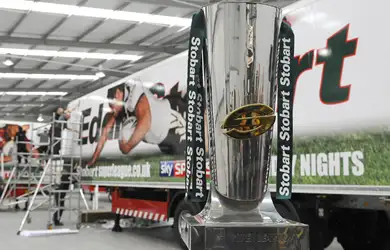Stobart deal could boost Super League’s sponsorship chances

The RFL today announced the end of what must surely be one of the most controversial sponsorship deals in rugby league history. Stobart’s sponsorship of Super League brought no additional revenue to the competition directly, but the RFL’s claim is that the arrangement which saw Super League branding on 100 Stobart lorries was worth as much as £2.5m per year to competition in terms of marketing and brand awareness.
Opinion is very much divided among rugby league supporters, with some viewing the deal as a stroke of genius, while the majority believe it to have been a huge mistake. Despite the RFL’s calculations of how much this deal was worth, fans remained sceptical of a sponsorship deal in which no money changed hands.
The RFL put a positive spin on the ill-fated arrangement in a press release earlier today, arguing that “Super League has increased its TV audience by 45 per cent and experienced record attendances to elevate the sport’s profile to unprecedented levels”. Yet the press release had the air of a white wash about it.
For instance, Super League commercial director James Mercer said: “We are delighted at the success of our one-year partnership with Stobart and the exposure that this ground-breaking concept has created. The partnership has placed the sport in a wonderful position to move into the next cycle of our commercial strategy in 2013”. All well and good, but this ignores the fact that the deal was originally for three years and the RFL had to invoke an opt-out clause in order to break it off two years early.
The sudden end of Stobart’s sponsorship was reported rather differently elsewhere. In the Guardian Andy Wilson reported that the RFL “agree[d] with Stobart to write off the existing three-year agreement as a disastrous mistake”. Wilson suggests that the deal was the work of Richard Lewis, and that his departure for the All England Club at Wimbledon has given Super League the opportunity to free itself of unwanted obligations.
Perhaps unfairly in a difficult climate, the RFL have been seen as incompetent for arranging a sponsorship deal in which the competition does not receive any money. Some have pointed to the alternative offer made by betting company Betfair – although it seems harsh to blame the RFL or the Super League clubs for turning down the offer given recent controversies in the game, and the rather paltry £750,000 Betfair had offered.
Yet with financial problems gripping clubs – most acutely Bradford Bulls – and the rarity of the Super League-branded lorries (I, among others, have never seen one) dissatisfaction with the deal has grown. It stings that the insurance company Aviva has paid as much as £20m for title sponsorship of the rugby union Premiership. And while the RFL suggested that other, paying, sponsors could come on board, none seem to have emerged.
There’s no doubt that the Stobart deal was a desperate gamble at a difficult time. It would be harsh to criticise the RFL too greatly, but on the other hand it defies reason to regard the deal as a act of brilliance and a complete success.
That said, if the figures quoted in the RFL press release for television audiences are accurate things might not turn out too badly. Red Hall believes viewing figures for Super League are up by 45 per cent. Their claim is that the Stobart deal is responsible for this, and it is true that the trucks included Sky Sports logos and adverts for the competitions television coverage. Perhaps this increase will allow the RFL to find a paying sponsor for Super League in 2013? Reports are that there are already talks ongoing with potential sponsors.
There’s a prevailing mood of pessimism around rugby league at the moment, perhaps understandably. But considering the positives, this Stobart deal may well lay the foundations for a better sponsorship deal to come.
Keep Your Eye On Rugby League
Twitter: @Tony_Williams88